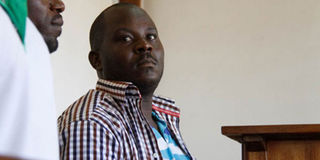Katusabe murder: Exhibits recovered in suspect’s home

Mr Muhammed Ssebuwufu (owner of Pine Car Bond). FILE PHOTO
What you need to know:
- In her ruling, Justice Senoga, agreed with state prosecutor Mr Alex Ojok’s submission that as a procedure, GAL sends to court stamped carbon copies of its lab investigation reports and keeps the originals. Mr Ojok had argued that the defence lawyer’s insistence on the original copy of the report could delay the trial for another year as the government lab is filled with bulky files.
- Dr Geoffrey Onen, who examined the blood samples collected from the scene of crime, had previously told court that the samples matched those of the deceased Katusabe.
KAMPALA- The investigating officer in the Pine Car Bond murder case told court on Thursday that police detectives recovered handcuffs that were used to tie hands of Donah Betty Katusabe before the accused tortured her to death.
In his testimony before the High Court, Detective Henry Peter Walya said when police searched the home of one of the suspects, Paul Tasingika in Namungoona, a city suburb, they recovered handcuffs and their keys, all wrapped in his wife’s dress and stashed in a suit case.
Eight suspects are on trial in the High Court on charges of murdering Katusabe on October 21, 2015 at Pine Car Bond on Lumumba Avenue in Kampala and robbing her of mobile phone worth Shs300, 000 before she was tortured to death with a machete and sticks.
“We also recovered four mobile phones without SIM cards in possession of Tasingika. We were forced to retain the items as exhibits because some of the eyewitnesses at the scene of crime told us that at the time the deceased was being tortured, her hands were clasped in handcuffs,” Mr Walya testified in court.
He said the phones were forwarded to the police cyber-crime department for identification to establish whether they were used on Katusabe.
The suspect Tasingika is jointly charged with seven others; Mr Muhammed Ssebuwufu (owner of Pine Car Bond); Godfrey Kayiza; Philip Mirambe; Stephen Lwanga; Yoweri Kitayimba; Damaseni Ssentongo and Shaban Otuddu.
Mr Walya made his testimony after the trial judge Flavia Anglin Senoga overruled the defence lawyer’s request to have the original copy of the forensic report from the Government Analytical Laboratory which had been presented by the prosecution.
In her ruling, Justice Senoga, agreed with state prosecutor Mr Alex Ojok’s submission that as a procedure, GAL sends to court stamped carbon copies of its lab investigation reports and keeps the originals. Mr Ojok had argued that the defence lawyer’s insistence on the original copy of the report could delay the trial for another year as the government lab is filled with bulky files.
Dr Geoffrey Onen, who examined the blood samples collected from the scene of crime, had previously told court that the samples matched those of the deceased Katusabe.
“…I received exhibits of blood samples, one from the car and another from the office walls. All the blood samples had DNA profile of female origin and from the same donor,” he told court.
Dr Onen further testified that all the samples were compared with the DNA profiles picked from Katusabe and they matched. His conclusion was that the samples had extremely strong genetic evidence of composition of the deceased.




